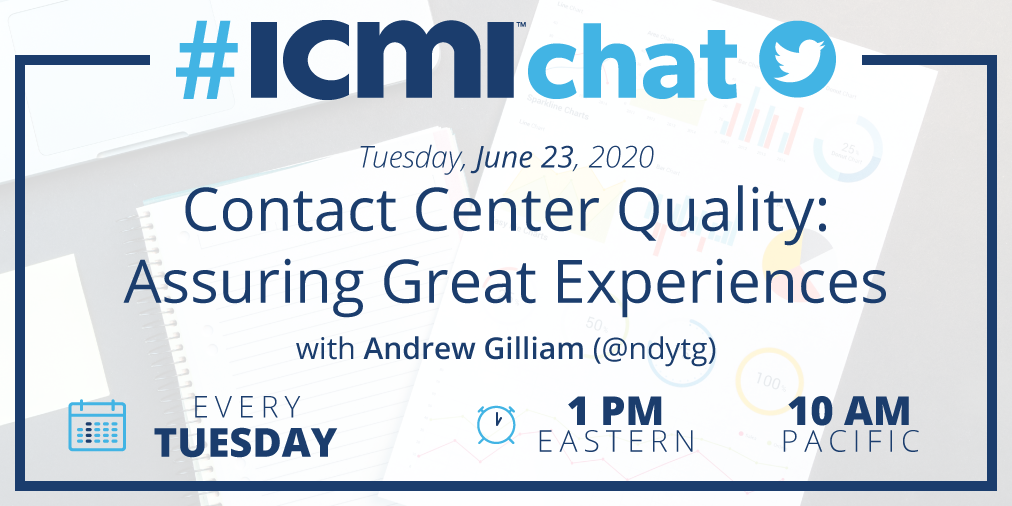By
The Editors
|
Date Published: June 17, 2020 - Last Updated September 08, 2020
|
Comments

If you're reading this, there's a good chance you work in a contact center. Because the term is familiar to us, we often take for granted the discipline required to run an effective contact center. Have you ever paused to consider what makes contact centers what they are? We put the #ICMIchat community on the spot to find out.

ICMI Virtual sponsors this week's rundown. With sessions covering agent experience, culture, metrics, cloud technology, and more, you won't want to miss this free event! Register for free to watch on-demand.
Join us on Tuesdays at 1 p.m. Eastern, 10 a.m. Pacific to weigh in on the contact center industry's most pressing challenges. Next week, we explore "Contact Center Quality: Assuring Great Experiences." A question preview follows this article.
What Makes A Contact Center
While any team that responds to customer queries by phone, chat, email, and social media fulfills the basic concept, contact centers are about much more than merely talking to customers. Contact centers are strategic operations that seek to build profitable connections between a company and its customers. They deliberately manage culture, cost, quality, and service levels to deliver outcomes necessary to help organizations achieve their mission. Contact centers, and their agents, focus on continually improving service delivery and customer journeys.
A contact center is not just people in a room answering phones, chats, and emails. Successful contact centers are thoughtful, purposeful communication centers where the flow of intelligent information goes both ways—from callers, to agents, to management and back.
A contact center is a centralized point to handle customer interactions across multiple channels. The aim is consistency, scalability, and efficiency.
Yep, a "contact center" is more than some people in a room answering phones & emails. The word "center" implies structure & "contact" implies willingness to serve in multiple channels, so those people may be at home, answering chats, texts, and tweets, too!
What Contact Centers Do
Contact centers are purposeful about their people, process, and technology, optimizing each to deliver consistent and reliable service. They make the most of their technology, turn data into insights, and take control of their destiny. Great contact centers anticipate customer needs and work with their business partners to preempt contacts before they happen, streamlining the customer journey.
I immediately think of software and CRM and the importance of one continuous conversation with the customer rather than a series of disjointed journey touch points and interactions. Our company is in a relationship with the customer.
Having the processes is the easiest part - HR (selection, hiring), Training, Coaching, Supervising, Leading, IT/Technology selection and implementation, Performance Management. The good ones are the ones that execute and make each of these work in tandem together.
Personalized experiences, where the end user feels seen and heard help make contact centers successful. In times where brands seem big and faceless, successful contact centers are able to offer a face and a human experience for that brand.
Recognizing Greatness
Although many contact centers aspire to follow industry best practices, there are dramatic variations in performance. Successful contact centers are guided by carefully developed strategies and values with desired outcomes in mind. Struggling contact centers are easily overwhelmed by the day-to-day and risk drifting off course from their goals.
A haphazard contact center is obvious...it happens when the employees don't want to be there and the customers dread having to interface with them. An effective contact center is where employees take great pride in serving customers, and the customers win!
1. Questions are answered, not transferred.
2. Agents sound passionate about their brand.
3. Agents are empowered to be decision makers.
If you hear them say "We don't have time for training, quality, meetings, fun, agent appreciation, etc..." then it's a pretty good indicator that they're flying by the seat of their pants. (I've been guilty as charged at points in my career.)
Sophistication in leadership and process management, consistency, frequency of fire fighting vs. effective planning. Frequently scaling up/down. Turnover rate. Is every day "all hands on deck". Just a few.
From Cost to Value
Like many support units, contact centers grapple with communicating their economic value to the organization they serve. They must change the mindset from expense minimization to that of a profitable investment. Contact centers create value for businesses in various ways, but it's not always easy to identify, quantify, and communicate them.
Effective contact centers are a huge part of customer retention, and it's far cheaper to keep an existing customer than acquire new ones. Happy and empowered customers, bolster brand reputation and drive repeat sales.
Those calls and complaints, at least in B2B world, are going to land somewhere. Do you want a CSR to handle them, or your field sales & service force? Too many salespeople are turned into CSRs, not doing either of them to their full potential.
Shepherding Customer Experience
Customer service, what contact centers deliver, is often confused with customer experience. While different, the customer service happening in contact centers is vital to mending broken experiences, and it's one of the best places to learn about designing better experiences. They interact with customers at all phases of their lifecycle, and their input is vital to creating incredible experiences.
You have to view the contact center as a key channel - not just a service channel, but listening post, sales channel - above all a key moment of truth - where the relationship can be degraded or enhanced.
The first ever time a person hears about your brand is often through marketing. Any interaction they have after that could land in a contact center. The best way to manage this is to triage the right channel for every conversation and create efficiency for everyone
Often, contact centers are part of the "after" in customers’ journey & marketing, sales, etc are part of the "before." But when customers have a great contact center experience, the contact center becomes part of marketing & sales in their minds, overall.
Executive Perceptions
Too often, contact centers are left to do their own thing. Few people outside the contact center do enough to understand the vital work happening within. Contact centers must actively communicate their value to the rest of the business, and they must engage partners in working together to achieve business goals.
Many have seen contact centers as a way to keep customers at bay - to "protect" other business units from annoying questions. The more enlightened view is that the contact center is an important part of embracing the customer.
AHHH this question might really get me going. So often the contact center employees are viewed as second-class citizens. This is wrong. THRILLED to see the contact center taking its rightful place as a strategic driver of CX!
Depends on company culture. Contact centers are sometimes undervalued because their role is auxiliary. Anyone with a good business sense recognizes the inherent value of quality support. It's a cornerstone of any high performing brand.
Working In Contact Centers
Customer service work is challenging enough; the surrounding environment can make or break employees. Although challenging, the work can also be incredibly rewarding and fulfilling. When contact center agents are empowered and respected, both the customer and agent experiences improve.
I have worked with contact centers that are very good places to work & others that are BAD, for example: no job security, no schedule predictability, grimy physical space, scheduled pee breaks, "2 min for after-call work," boring tasks which must be completed in too little time.
I can't speak to the general - I've heard horror stories, but I loved my job working customer support at Zendesk. I felt like a hero every day, not saving anyone's life to be sure, and not putting myself in danger, but in making people's day better.
Contact center work is almost always hard work -- even in a positive work environment. I've seen very successful teams amid really sucky, difficult, boring, repetitive work and they were successful because of culture, great leadership, and team cohesion.
Embracing the Future
All the hype around artificial intelligence and renewed concerns about controlling costs would make a reasonable person think that contact centers are on their way out. While simple work will be deferred to automated and self-service channels, contact center agents will always be vital contributors to a company's relationship with customers. The work will change, though. In the future, contact center agents will handle more complicated contacts, pave the way for automation, remediate problems before a customer calls, and generate insight to further business' strategic goals.
Easy-peasy. The contact center will be able to identify sticking points in the overall journey, and proactively reach out to that customer guiding them to success in a whole new creative way!
One logical way contact centers can deliver value is to lead the charge in building the knowledge base and self-service content based on top call drivers. This paves the way for AI and chatbots.
People might hate speaking with other people, but they surely hate bots more! The value in a contact center is speaking to a person who can feel my pain, they may have also gone through it, it’s therapeutic.
#ICMIchat June 23, 2020
Contact Center Quality: Assuring Great Experiences

Q1: What is quality assurance (QA) in the context of a contact center?
Q2: What practices comprise a contact center’s quality management process? What do QA teams actually do?
Q3: Who sets the quality standard? That is, how do you know if something is “good enough?” Are there multiple stakeholders or priorities that must be considered?
Q4: How does quality assurance contribute to the contact center and business’ success?
Q5: Who should convey quality recommendations to agents, e.g. QA team, supervisors, peers? How often?
Q6: Removing numerical ratings from the QA feedback process is generating buzz in the industry. How might scores be detrimental to quality? Is there a downside of going scoreless?
Q7: How are quality management practices related to other performance management activities, such as performance appraisals?
Q8: Is quality assurance only for large contact centers, or should everyone have a QA program? How is it different for small teams?
Photo by ThisIsEngineering from Pexels.